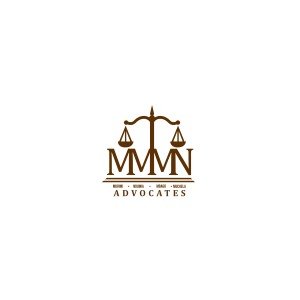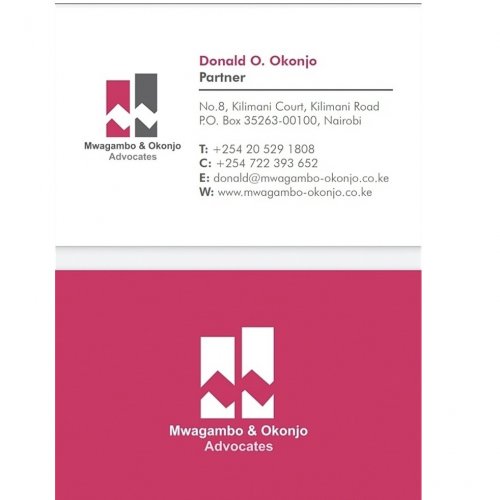Best Marine Insurance Lawyers in Nairobi
Share your needs with us, get contacted by law firms.
Free. Takes 2 min.
List of the best lawyers in Nairobi, Kenya
About Marine Insurance Law in Nairobi, Kenya
Marine insurance law in Nairobi, Kenya, deals with the protection against risks to ships and to goods carried on them. It is a specialized field that ensures the economic stability and protection of maritime trade, which is vital for Kenya's status as a key player in the East African trade ecosystem. Nairobi, being the capital and commercial hub, houses various marine insurance providers and legal practitioners that navigate the complex nuances of this field, helping shipowners, cargo owners, and other stakeholders in managing and transferring risk.
Why You May Need a Lawyer
There are several scenarios in which you might require the expertise of a lawyer specializing in marine insurance:
- Dispute Resolution: Conflicts between insurers and policyholders regarding coverage and claims.
- Contract Reviews: Understanding the complexities of marine insurance policies before signing.
- Claims Filing: Assisting in the accurate and timely filing of insurance claims.
- Compliance Issues: Ensuring adherence to both local and international maritime regulations.
- Fraud Prevention: Identifying and preventing fraudulent insurance claims.
In these circumstances, a lawyer can ensure your rights are protected and can provide personalized advice tailored to your situation.
Local Laws Overview
Marine insurance in Kenya is governed by local statutes as well as international conventions. Key aspects include:
- Insurance Act: Governs the practice of insurance, including marine insurance.
- Marine Insurance Act: Specifically addresses the provisions related to marine insurance contracts such as insurable interest, indemnity, and warranties.
- Carriage by Sea Act: Affects the liability and obligations of carriers under contracts for the carriage of goods by sea.
- Admiralty Jurisdiction: Enables courts to hear and determine matters related to maritime disputes.
These laws are essential for ensuring that marine insurance operations are conducted transparently and fairly, balancing the rights and obligations of all parties involved.
Frequently Asked Questions
1. What does marine insurance cover?
Marine insurance generally covers loss or damage to ships, cargo, terminals, and any transport or cargo by which property is transferred, acquired, or held between points of origin and final destination.
2. Is marine insurance mandatory in Nairobi, Kenya?
While not always mandatory, marine insurance is strongly recommended and often required by shipping contracts or during customs clearance to protect against potential losses.
3. How are marine insurance premiums determined?
Premiums are typically determined based on the value of the cargo or vessel, the route, the type of coverage, and historical loss data.
4. What should I do if my claim is denied?
If your claim is denied, you should consult a marine insurance lawyer to review the denial reason, policy terms, and determine the feasibility of contesting the insurer's decision.
5. Can I insure partial shipments?
Yes, you can insure partial shipments, but it’s important that each part of the shipment is precisely documented to avoid disputes in case of partial loss or damage.
6. What is the role of a surveyor in marine insurance?
A surveyor assesses and reports on the condition of the vessel or cargo, providing critical information that influences underwriting and claims processing.
7. How does international law affect marine insurance in Kenya?
International conventions and laws, such as the Hague-Visby Rules, also impact marine insurance policies and claims, especially concerning liabilities and the carriage of goods by sea.
8. What is a general average in marine insurance?
General average refers to a principle where all parties in a sea venture proportionally share any loss resulting from a voluntary sacrifice of part of the ship or cargo to save the whole in an emergency.
9. What types of losses are excluded from marine insurance policies?
Common exclusions include losses due to inherent vice, deliberate acts, war, strikes, or negligence by the insured.
10. How can insurers assess the risk associated with marine insurance policies?
Insurers assess risk through various factors such as freight route, type of cargo, historical data, and presence of natural calamities on the shipping route.
Additional Resources
Here are some resources that might be helpful:
- The Insurance Regulatory Authority (IRA): Governs and regulates marine insurance amongst other forms of insurance within Kenya.
- The Association of Kenya Insurers (AKI): This body promotes the interests of insurers including addressing issues within marine insurance.
- Kenya Maritime Authority (KMA): Plays a role in ensuring safety and security standards in marine operations in Kenya.
- The East African Law Society: Provides contacts and information on qualified marine insurance lawyers in the region.
Next Steps
If you need legal assistance with marine insurance, it is recommended to:
- Identify your specific legal need - be it contract review, claims dispute, or compliance issues.
- Research and contact a reputable marine insurance lawyer or law firm based in Nairobi.
- Prepare all necessary documents and a summary of your situation to facilitate an initial consultation.
- Consider joining marine and legal forums or workshops to expand your understanding of the subject.
Taking these steps can help you navigate the complexities of marine insurance laws efficiently and effectively.
Lawzana helps you find the best lawyers and law firms in Nairobi through a curated and pre-screened list of qualified legal professionals. Our platform offers rankings and detailed profiles of attorneys and law firms, allowing you to compare based on practice areas, including Marine Insurance, experience, and client feedback.
Each profile includes a description of the firm's areas of practice, client reviews, team members and partners, year of establishment, spoken languages, office locations, contact information, social media presence, and any published articles or resources. Most firms on our platform speak English and are experienced in both local and international legal matters.
Get a quote from top-rated law firms in Nairobi, Kenya — quickly, securely, and without unnecessary hassle.
Disclaimer:
The information provided on this page is for general informational purposes only and does not constitute legal advice. While we strive to ensure the accuracy and relevance of the content, legal information may change over time, and interpretations of the law can vary. You should always consult with a qualified legal professional for advice specific to your situation.
We disclaim all liability for actions taken or not taken based on the content of this page. If you believe any information is incorrect or outdated, please contact us, and we will review and update it where appropriate.

















